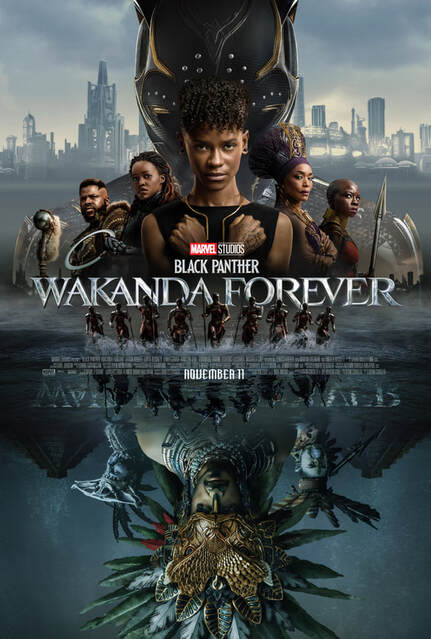Written by Zeke Perez Jr.  (L-R): Danai Gurira as Okoye and Letitia Wright as Shuri in Marvel Studios' BLACK PANTHER: WAKANDA FOREVER. Photo by Eli Adé. © 2022 MARVEL. (L-R): Danai Gurira as Okoye and Letitia Wright as Shuri in Marvel Studios' BLACK PANTHER: WAKANDA FOREVER. Photo by Eli Adé. © 2022 MARVEL. Caution: This article contains minor spoilers for the motion picture, ‘Black Panther: Wakanda Forever’. In an emotional, enthralling, and action-packed new chapter, Black Panther: Wakanda Forever closes out Phase Four of the MCU on a high note. While much of Phase Four felt like it was treading water without solid threads of continuity in its movies and shows, this entry felt like a return to the reigned in, purposeful sagas from before. A lot was expected of Wakanda Forever. The first Black Panther had the sixth highest grossing opening weekend of all Marvel films and remains the third highest grossing Marvel film across its lifetime, pointing to not only the initial appeal of the character, but the fanfare and staying power that followed. It excelled in its worldwide reach and was praised for its acting, soundtrack, role in the broader Marvel universe, storyline, and representation. This film was tasked with building on the cultural impact of the first movie, upping the ante and moving the MCU forward to set up Phase Five, tying together several loose ends from the movies and shows that hadn’t yet paid off, and providing closure on T’Challa. While there are moments that feel rushed along or dropped in solely to accomplish some of these goals, it does each of those things extremely well. First and foremost, the film masterfully serves as a farewell to a deep character, a great actor, and an even greater human. Chadwick Boseman was the heart and soul of the franchise, and Wakanda Forever takes its time to pay its respects. The crux of the film is bookended by the cold open and Marvel Studios intro reel and the mid credits scene, all of which provide what feels like both a sendoff to the character of T’Challa and a genuine tribute to Boseman. It’s evident how much Boseman meant to this franchise, and Ryan Coogler and the cast honored his memory in a fantastic, authentic way. With Boseman’s death, the story was taken in a different direction as the mantle of the Black Panther was freed up. This sequel shows how T’Challa’s family and all of Wakanda deal with the loss. It uses this as a vessel to explore how the characters we’re familiar with each deal with grief and mortality. Queen Ramonda and Princess Shuri take the loss the most directly, each battling between compassion and vengeance in how they view the world. A trip to the Ancestral Plane reveals a tilt in this battle that proves pivotal for the finale of the movie - and potentially for the MCU as a whole.  We revisit several other characters from Black Panther and the MCU. To name a few (barring surprises or spoilers): Nakia deals with the grief through distance. We find that she has spent her time away from Wakanda following the Blip and following T’Challa’s death, seeking space from the community. Okoye remains in Wakanda as part of the Dora Milaje, dealing with her own role in the society. M’Baku is back, serving as both solid comic relief and as an important advisor from the Jabari Tribe on key matters for Wakanda’s approach to world affairs. Wakanda Forever introduces several new characters that could serve in vital roles in the MCU, including a certain key puzzle piece for the Young Avengers. Additionally, the film’s main antagonist, Namor or K’uk’ulkan, provides an interesting and important take on the character. Traditionally, Namor is a superhuman hailing from Atlantis. This movie’s Namor shares some of the qualities of the source material, but is integrated into the storytelling of the Black Panther universe. He brings his own mythos, built upon Mayan civilization and folklore. Even his name is adapted, swapping emphasis on the pronunciation (“sin amor”, without love) to add a rich cultural component. Further mapping out Black, Latin American, and Indigenous characters in the storytelling adds to the worldbuilding that made the first movie so special. Namor is also well rounded in his motivation and conflict. With superhero movies, we’re constantly treated to clashes of the titans. Equally matched heroes and villains go toe-to-toe or superteams erupt in civil wars. But something about the battle between Wakanda and Talokan here feels even more colossal. The world below feels like an immediate threat, not just because of brute force, but because of its intellect and technology. The antagonists don’t necessarily come from a place of pure villainy, either. Instead, Namor leads his people through the same challenge that confronts Wakandans; what is their place and how do they handle the outside world? The similarities of these two civilizations, rather than their differences, make the story much more intriguing. Considering the sights and sounds, Wakanda Forever stacks up nicely to its predecessor. The soundtrack may be a little more understated that Kendrick Lamar’s up-tempo masterpiece that featured in the first movie, but it fits the tone of the story extremely well, building around a staple track by Rihanna (“Lift Me Up”) and a phenomenal score. The score amps up the intensity of a number of action scenes, particularly the suspenseful underwater scenes early on. Visually, the underwater scenes shine, too. The interplay between land and sea is stunning. One breathtaking moment sees the Jabari Tribe and the Dora Milaje working together off the side of a ship, plunging down into the sea. The cityscapes of Wakanda and the underwater world of Talokan provide vast backdrops for much of the action. While Wakanda Forever shows how expansive the MCU has become, carrying a few subplots that feel forced in because they were introduced four movies and three TV shows ago and must finally be put somewhere, it also does a lot of good. It starts to connect some of those dots that haven’t had a payoff, making us eagerly countdown to the next release date. It shows us how powerful a fictional world can be. And it reminds us why we love these movies and the actors that bring these characters to life. While it’s impossible to replace a character, Wakanda Forever carries on a legacy. We’ll miss you, King T’Challa. Thank you for everything, Chadwick Boseman.
0 Comments
Leave a Reply. |
Archives
March 2025
|
|
© 2012-2025, Nerds That Geek LLC.
All Rights Reserved. |
uWeb Hosting by FatCow


 RSS Feed
RSS Feed